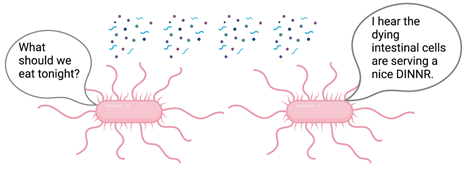‘Feeding on the dead’: new insights in chemotherapy-induced gastrointestinal toxicity
It has been known for a few decades now that the process of (intestinal) cell death can influence bacterial infections in an indirect way by interfering with the body’s immune response, and that dying cells can communicate with their neighbors. However, whether dying cells can influence bacteria in a direct way has remained unclear.
Using cell culture and healthy mouse tissue model systems, Dr. CJ Anderson and his colleagues of the Prof. Kodi Ravichandran team investigated exactly this. They discovered that certain molecules that are actively produced and shed by intestinal epithelial cells when they start to die, can also be sensed and used directly by intestinal bacteria such as Salmonella and E. coli to assist them in colonization during food poisoning, inflammatory conditions and chemotherapy-induced mucositis.
The latter is very relevant in the context of cancer patient care, as gastrointestinal toxicity due to chemotherapy treatment not only affects the quality of life, but also often necessitates dose alterations and increases the risk of developing subsequent infections.
Dr. CJ Anderson: "This relationship between chemotherapy and bacterial infections was particularly interesting to us. Unlike foodborne infections or flareups of IBD or Crohn's Disease where a patient does not know when he or she will be 'under attack', physicians know exactly when they are administering chemotherapeutic drugs to cancer patients. This means we have a therapeutic window where we can try to develop some sort of combination therapy to limit some of this fuel for bacteria. As with any piece of fundamental research, there is more work to be done, but the opportunity is there for future therapies."
Of note, CJ recently received a CRIG grant to continue his work in this promising field, called ‘Identification of death-dependent secreted metabolites from tumor and healthy epithelial cells’. In this project, CJ wants to identify the metabolites within the apoptotic supernatants that promote intestinal dysbiosis after cancer therapies.
Read more in the VIB press release.
Discover the article via this link.
